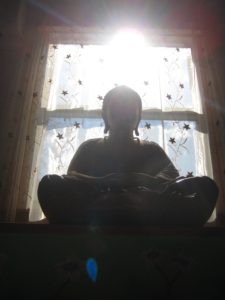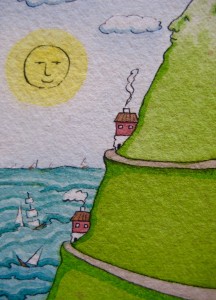No audio channeling today, check out today’s Soulbyte instead, posted on the channeling page. Next audio channeling, Monday June 6, 2016.
All posts by Chuck
Chuck’s Place: The Healing Ticket
In the mystery play of our time, Donald Trump is emerging as Helios, the sun god, a golden redeemer. The stronghold of reason is crumbling and the hunger for divine renewal appears to be landing upon his golden locks.
A religious fervor is stirring in the masses, in all of us. The renewal we really crave is transcendent ecstatic experience. The problem with Donald’s solution is his complete identification with ego as divine Self. In other words, total exaltation of the ego with divine imperative. “Make America Great Again,” as catchy as it is, is complete ego coronation, as it solves the destruction of the world through a restoration of the myth that America is God’s chosen one whose grand imperative is purification and masculine power domination.
The mystery play denies the necessity to take the journey into the depths of the earth to face the truth of the destruction and neglect of the feminine, of its divinity and source of healing and renewal.

– Photo by Jan Ketchel
Trump reflects the ego in all its might—Helios the sun god obliterating all the darkness in its one-sided enlightenment. This is a very personal story for all earth inhabitants. We all have ego selves, that which governs our decisions and actions in life. Ego of our time is dominated by reason. But reason, for all its order, is deplete of body experience. Reason is localized in the head; it is abstract, dissociated from our true animal aliveness.
Our modern religions are dominated by reason, they don’t link us to the living substance within ourself. This is why the modern world is addicted; addiction is our hidden pagan compensation to partake of the divine substance so critical to sustain life. Of course, addiction is equally as one-sided as reason—it knows no limits, like Icarus, who imagined himself as Helios and melted from getting too close to the heat of the sun, falling to his death upon the earth.
Trump is the ultimate symbol of the addict: we can have it all, he says, there are no limits! This is the collective masculine ego’s last stand and it is empowered by ego identification with divine energy, with God, but like Icarus it is really just ego unleashed and if I am reading it correctly, it can only go so high before it is doomed to go down.
This hunger for divine experience has been burgeoning beneath the rule of reason for too long, and the charismatic Trump advantage lies in its fervor. This truly is what happened in Nazi Germany. The irrational fervor latent in the German Volk was galvanized by a charismatic leader who extolled purification and masculine domination, overtaking their cultured humanity and sending them, and the rest of the world, into the darkest time in recent modern history.
To learn from history would be to not repeat it. Collective energy, including all that fervor, is made up of the energy of individuals. To separate the individual self from the collective is Step One, while at the same time accepting the truth that as individuals we are still a microcosm of the collective. The advantage of individuality, however, is one of manageability. For however vast the challenge, it is possible for the individual to take the plunge into the full truth of the many-sided self, where all the ancient mysteries and transformations are possible, without harm to the collective.
Individuals can assume responsibility for themselves, and must, as historical fact shows that collectives are largely impossible to control. Unfortunately, there is now a curious total absence of individual responsibility, in fact, things are devolving into something of a mass blood thirst. The time is ripe for the individual to take responsibility, one person at a time. Let’s hope we are not too late!

– Photo by Jan Ketchel
To begin immediate and active participation in becoming responsible, each individual can square with the divine masculine and the divine feminine within the self, each finding their own unique and individual way to the Middle Way, the ultimate goal within and without. It is impossible to define that Middle Way on a collective level, for all must find legitimate balance and reconciliation within all that one is made up of, within the self.
If enough people can make the effort to find their way to this Tao within, the world will find its way to the healing ticket too!
Squaring with the divine,
Chuck
Chuck’s Place: Why We Matter
On an individual level, the deepest question we can ask ourselves is, “Why am I here?” On a collective level, the deepest question we can ask ourselves is, “Why are we here?”
After years of focused exploration in the spiritual realm, seeking proof of and versatility in life beyond the body, I found myself drawn powerfully back into this world. I know my focus needed to first be in the spiritual world because I could not avoid exploring the question, “What comes next, is there life beyond this life?”

– Photo by Chuck Ketchel
Recently, however, I was drawn powerfully back to focus on life in this world. In fact, for the past several months I have been drawn to volume after volume of notes taken at Jung’s seminars in the 1920s and 1930s. I realize that the energy of now mimics the energy of that time and that Jung was thoroughly engaged in comprehending its questions and attempting to provide answers. Those questions were answered but not solved in his time. We live in the further unfolding of the seeds of that time and are asked, in our time, to provide the next evolution of answers.
The stakes are indeed much greater now. Though the horror of Hitler still hovers, it pales in significance to the threat of total world annihilation, which is the truth of our current predicament. To soften that blow I refer to a dream Jung had where he met a yogi in deep meditation. This yogi was, Jung realized, dreaming his, Jung’s, life. When he looked closer at the yogi he realized it was an exact replica of himself. He also realized that once the yogi awoke from his dream Jung’s life in this world would be over, though life itself would go on in another realm, in a another dream.
That is our predicament now, we are the collective participants of God’s dream. We are the incarnation of God’s dream. That makes us all, like Christ, God made human, set down in our collective world to freely explore the evolution of God’s dream.
Our world dream, Earth, has been an epic dream that has managed to never end because we, in the dream, have always found a way to keep it going, to both create and solve innumerable challenges that continue to evolve the dream. And it’s a beautiful dream, one we’d like to keep going!
In our time, we have forced this dream to epic challenges. Can we rescue ourselves from the clash of forces that scream out for a major evolutionary advancement? Hitler heralded an attempt to maintain purity of line at all costs. That motive has fully matured on the world stage at this very moment. Tribalism, purity of line, separation of races, religions, classes and sexes are all at war with the ultimate world melting pot that we must evolve into if we are to continue our dream on a more secure footing.
The truth is, God is indifferent to the outcome. Here I speak of God beyond incarnation, eternal God. For that God, whom we are the seeds of, all is forgiven because the outcome of our dream was left to us to freely and creatively grow and discover. That is how God grows. We are the creative side of God and we are here to discover things.
If this dream ends, God will not be angry or disappointed. God grows and learns regardless of the outcome. All outcomes are seeds of future eternal dreams. Nonetheless, this is a beautiful dream and it presents fascinating challenges.
From the perspectives I articulate here, I arrive at detachment. For me, detachment is merely having a fuller perspective that enables access to true solutions to problems. Detachment requires, however, that we fully suffer being in finite, human form. Only from that place can the true answers arrive. God outside time and space cannot provide the answers. Only incarnated God, in time and space, can provide the answers. And that’s us!
So, from inside the dream, feeling the full weight of endgame time, waking up now, I find that love in the form of suspending judgment appears as the clear resolution. To suspend judgment is to erase hierarchy; all are equally valuable, good, bad, and ugly. We are all necessary parts of the same whole. Each of us is necessary and vital, playing our unique part in the struggle to evolve the dream.
Love is embracing every aspect of the interconnected whole that we are, each of us trying desperately to solve the problem of a higher level of integration. And those that fight it the most must be loved and embraced for their role in forcing all of us to solve the issue our parent’s generation could only shelve.
It’s fully off the shelf now and WE MATTER, because without all hands on deck this dream will be shelved as the yogi comes out of meditation.
In meditation,
Chuck
Chuck’s Place: Sailing
Anxiety, fear, terror, joy, ecstasy—these are the emotions we experience when we anticipate or are in direct contact with what Jung called the collective unconscious. For Jung, the collective unconscious was the home of our eternal self, part of which has incarnated in finite human form in the life we are now living in this world.

– Art by Jan Ketchel
Though shielded by veils, our fragile egos, like small sailboats, ride the waves of our eternal selves in the ocean of the collective unconscious. And like those small crafts dwarfed by the vast ocean we are both terrified and excited to merge with and bring into this life a fuller experience of all that we are. Jung called this individuation, the act of truly unfolding and becoming all that we are.
The Shamans of Ancient Mexico arrived at the same understanding of the human predicament, using their own descriptive metaphors. Those Shamans identified the eternal in ourselves as the energy body, the part that leaves the “fixation of the assemblage point,” that is, the fixation of awareness on the world of everyday life, and ventures into our greater potential in infinity in our dreams.
Shamans and psychotherapists alike are aware of the collective unconscious, or infinity, and the resulting emotional reactions of terror and tremendum upon encountering this dimension of our being.
In prior times, religions constructed safe havens and technologies to shield yet relate the faithful to the greater energy of infinity. In today’s world, the dominance of the rational mind has largely shut down belief in infinity and left many to face the tremendum of infinity with little other than psychopharmacological interventions to regulate the central nervous system as it fields the emotional impact of infinity. How may times a day do we encounter anxiety, fear, terror and ecstasy? These are all the surface rumblings of truths great and small that lie in the vast unconscious where the bulk of what we are resides.
Jung came to call the reservoir of repressed traumas from our lives in this world the personal unconscious. And those traumas cry out for recognition and reconciliation through the triggers that evoke powerful emotions in our daily lives. In our day, psychotherapy and shamanic recapitulation provide technologies to face and integrate this shadow side of our psyche. Once we have reclaimed the energy from this dimension of our unknown selves we are opened to the riches of higher fulfillment, yet at the same time we are also open to the deeper layers of the collective unconscious as well.
For me, dreaming is the point of intersection for both psychotherapy and the shamanic world, for both communing with and finding support from the far reaches of our infinite selves, offering us the opportunity to actualize and fulfill the life we currently find ourselves in. Dreaming is all about forging a relationship with the infinite self.
To begin a relationship with the deeper self ask it for a dream. When you wake up with even but a morsel of an image from a dream do not judge it; stop, write it down, sketch it. As the day unfolds return to the image or the dream, several times; simply relive it. Notice what automatically pops into your head as you do this, without thinking, simply noticing what spontaneously arises. Perhaps you’ll get a message. Actualize that message in some concrete way, i.e., write it down, incorporate it into an action.
Over time, your unconscious will speak more clearly to you, as it very much appreciates your attention. Never dismiss its guidance but don’t (usually) take it too literally either, as it speaks in symbols, that’s its language. But it’s actually a code specifically designed for you, so keep cracking it!
As you deepen your relationship with your deeper self you will be invited into deeper journeys into infinity. In fact, you will be taught how to solicit and prepare for them even before sleep and dream. This marks the transition from passive to active dreaming, the bridge into infinity that all can cross now, bringing the riches of infinity into the current life now being lived.
From this approach, all of life becomes a spiritual journey where intense emotions and experiences are seen as callings from infinity to address deeper truths and clear the channel for a greater influx of infinite energy to enrich and individuate the life you are now living.
Dream on,
Chuck
Chuck’s Place: The Hidden Relationship
Last week I wrote of spirit and soul, the divine twins that are the essence of what we are. Spirit manifests as logos, as mind and thought activity. Soul, as eros, manifests as feeling and connection. Spirit floats away from the earth, soul embraces it.

– Photo by Jan Ketchel
Logos is the dominant principle in men, eros the dominant nature in women. In the background of a man’s deeper unconscious lies his soul, eros, what Jung called the anima. In the background of a woman’s greater unconscious lies her spirit, logos, what Jung termed the animus.
The anima in men and the animus in women are autonomous, independent characters that greatly overshadow the ego and impact moods, opinions and relationships in a variety of ways.
For men, the ability to feel, create artistically, and form a loving relationship is greatly influenced by the quality of their relationship with their inner woman, their anima. Some mens’ egos are quite comfortable with their animas and they allow her a great deal of play in their choice of career, aesthetic sensibility, and quality of relationship. Such men are said to be truly in touch with their feminine side.
Oftentimes a man might cling too dominantly to his rational, logos side to the disgust of his inner anima. Her revenge might be to overpower his day with hurt feelings and dark moods. She might as well put a spell on him by projecting herself onto another person, entrancing him into a highly inappropriate relationship.
Women might find themselves lending their animus a dominant role in their lives as well, dedicating themselves to careers or causes requiring a strong logos spirit. On the other hand, women may also shut out or be unaware of the workings of their inner animus who can become the opinionated voice of their internal dialogue, casting a negative spell upon all they touch.
Most relationship problems can be traced to the hidden influences of anima and animus, which lead to hurt feelings and opinionated misunderstandings. To disentangle from the web of these battles requires that each individual get to know their own inner “soul mate.”
Interestingly, this inner confusion has found a concrete form in the transgender issue so hotly politicized in our time. The truth is that all humans are at least psychologically hermaphroditic, and they must get to know and bring these opposite parts into a working relationship to achieve wholeness.

– Photo by Jan Ketchel
The Shamans of Ancient Mexico’s number one dictum, “suspend judgment,” is of vital importance in discovering the truth of the self. Both the anima and the animus, each in their own way, generate judgments. The anima overpowers with feelings that tell us we’re not being treated fairly or properly loved. The animus forcefully tells us what is right based on generalized “facts” that “everyone knows to be true.”
If we can suspend our tendency to be duped by these automatic feelings and opinions, which compulsively seek to take charge of our perceptions and reactions, we are freed to see and experience reality as it truly is. We are freed to experience clear objective thinking and genuine feelings in ways that lead to balanced wholeness within and real relationship without.
What is asked is that all muster the courage to truly know thy self. And the true self is a many faceted being of many part selves, all of which must be discovered, recognized, but also required to drop their prejudices for the sake of inner wholeness and genuine outer connection.
The true inner work of individuation, of becoming the true individual self we are, by reconciling the differences within with one’s respective inner mate—be it anima or animus—is the only hope for achieving individual fulfillment and a fulfilling relationship.
Exploring the hidden,
Chuck
